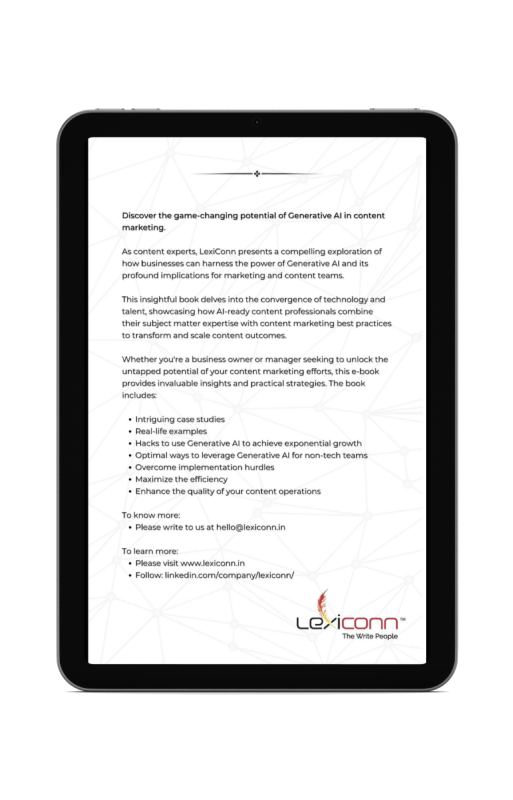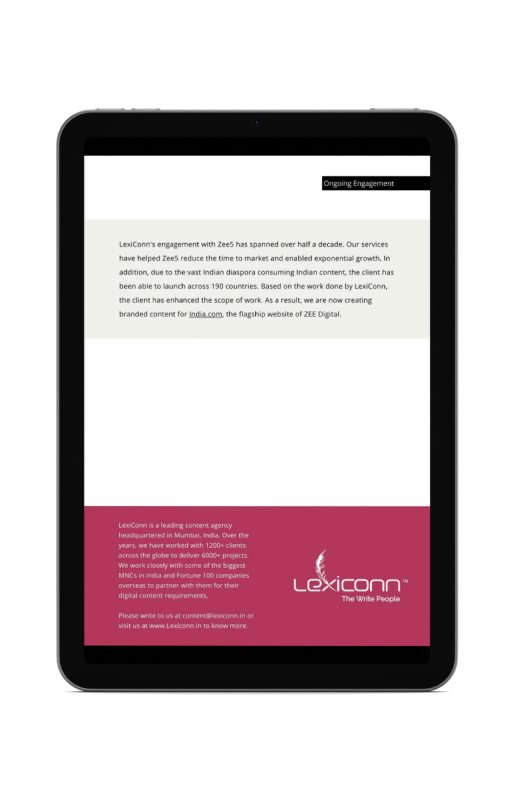In today’s fast-paced digital landscape, creating user-centric products is crucial for business success. One of the elements that gets overlooked is the effectiveness of a UX copy. A well-created UX copy serves as a guide for the users. This blog will explore the importance of UX copy in designing user-centric products, offering valuable insights, practical tips, and statistics to support the need for quality UX writing.

UX copy refers to the text that guides users through a digital product. It encompasses everything from button labels and error messages to onboarding instructions and notifications. Unlike traditional marketing copy, which aims to persuade or sell, UX copy focuses on clarity and usability. The primary goal of UX is to enhance the user experience by making interactions intuitive and straightforward.
Effective UX copy plays a crucial role in user-centric design. It helps users navigate products seamlessly, reducing confusion and frustration. 88% of online users may not return to a website after a bad user experience. This statistic underscores the importance of clear and engaging copy in retaining users.

The first step in creating user-centric products is ensuring usability. Clear and concise UX copy improves navigation and helps users figure out how to interact with a product website. For instance, using straightforward language in button labels. It can help users to complete tasks.
According to Nielsen Norman Group, users read only about 20% of the text on a webpage. This emphasizes the need for concise messaging that captures attention quickly. Effective UX copy should guide users effortlessly through their journey, making it easier for them to achieve their goals.
UX copy also influences user behavior. Well-crafted messaging can guide users toward desired actions, such as signing up for a newsletter or making a purchase. A Intechnic, an extremely well-designed user interface leads to an increase in conversion rates by up to 200%.
By strategically placing calls to action (CTAs) within the content, businesses can encourage users to take specific actions. For example, using action-oriented language like "Get Started" or "Join Now" can motivate users to engage with the product further.
Friction occurs when users encounter obstacles while navigating a product. Effective UX copy minimizes this friction by providing clear instructions and feedback.
According to UXCam, 74% of users are likely to return to a website with good mobile UX. This highlights how thoughtful UX copy can make navigation through a website easy, leading to overall satisfaction.
Trust is essential for user retention. Transparent and helpful messaging fosters trust between users and brands. When users feel confident that they understand how to use a product, they are more likely to return.
For instance, including reassuring language during checkout processes can alleviate concerns about security or payment issues. Phrases like "Your information is secure" or "Trusted by thousands of customers" can help build confidence in the brand.
Maintaining consistency in tone and voice across all touchpoints is crucial for building credibility. Users should feel that they are interacting with the same brand throughout their journey. This consistency reinforces brand identity and helps establish trust.
A study by Lucidpress indicates that consistent brand presentation across all platforms increases overall growth by 10%-20%. This statistic underscores the critical role of maintaining a cohesive voice in UX copywriting.
Storytelling is a powerful tool in UX copywriting. By weaving narratives into the user experience, brands can create emotional connections with their audience. This engagement enhances user satisfaction and encourages loyalty.
For example, brands like Airbnb use storytelling in their messaging by showcasing unique experiences from hosts around the world. This approach not only informs users but also evokes emotions that resonate with their target audience.
Using relatable language in UX copy makes it easier for users to connect with the brand. When users see themselves reflected in the messaging, they are more likely to engage with the product.
Using inclusive language that speaks directly to diverse audiences fosters a sense of belonging. Brands should aim to create an authentic voice that resonates with their target demographic.
Investing in quality UX writing yields significant returns.
Research by Forrester shows that companies that prioritize user experience see a 17% increase in revenue within three years. By focusing on UX copy, businesses can drive conversions and enhance user retention.

Designing user-centric products is essential for business success. User Experience (UX) focuses on creating meaningful interactions that enhance satisfaction and loyalty. However, achieving effective UX requires professional expertise. Here’s how UX is applied in product design and why expert services are vital.

Content agencies in India specialize in delivering UX services that enhance user satisfaction and drive business success. Here’s how some agencies contribute to effective UX design and why their expertise is essential for your business.
To learn more about UX writing services, visit LexiConn!
Content agencies conduct extensive user research to uncover insights into user preferences and behaviors. This research includes methods like surveys, interviews, and observational studies.
Agencies analyze user feedback to identify pain points that hinder the user experience. This data-driven approach enhances effective UX copy.
Agencies develop detailed user personas representing various target audience segments. This is done by adhering to effective UX writing tips.
With well-defined personas, agencies tailor design strategies to meet specific user needs. This approach reinforces the importance of user experience copywriting.
Content agencies create wireframes to outline digital product structures. Wireframes serve as blueprints, allowing teams to visualize user interactions. Prototyping enables stakeholders to test interactive models early. This iterative approach allows quick adjustments based on user feedback.
Conducting usability tests is essential as agencies observe real users interacting with products. This process identifies usability issues before launch. Expert analysis during testing gathers feedback from diverse user groups. Proper feedback aids experts in making informed adjustments to enhance usability, aligning with best practices in UX content writing.
Content agencies ensure branding guidelines are followed throughout the design process. This consistency fosters customer loyalty and recognition, reinforcing user experience copywriting.
The UX design process continues after launch; gathering feedback is essential for improvement. Agencies help businesses implement systems for collecting user feedback. By analyzing post-launch data, they identify enhancement areas to keep products relevant. This proactive approach drives user satisfaction and demonstrates the critical nature of effective UX copy.
Effective UX copywriting services are essential for business success. Quality UX writing enhances user satisfaction, retention, and conversion rates. Prioritizing user experience is crucial for substantial returns on investment.
By focusing on clarity, consistency, and relatability, effective UX copy guides users and reduces friction. Businesses that prioritize UX writing experience improved user engagement, leading to long-term growth.
Investing in quality UX copy benefits both users and the bottom line. This investment demonstrates the importance of UX writing tips for creating impactful user experiences. Now is the time to embrace effective UX copywriting to drive success.
Visit us at LexiConn or drop us a line at [email protected]. LexiConn also offers a free 30-minute content consultation session to help you with your content strategy.



I have read and accept the Privacy Policy
Read More